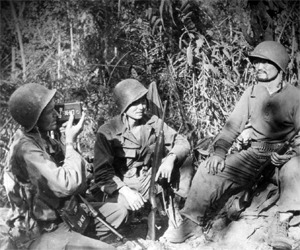He was all of eight years old when Roy Matsumoto and his brother boarded a steamer bound for the family’s ancestral home in Japan.
Nine years later, in 1930, Roy would cross the Pacific Ocean once again, at the age of 17, this time headed back to his birthplace near Los Angeles, Calif., to high school and a job in a grocery store, where, in what would prove a most fateful episode, he would come to recognize and to understand the numerous dialects spoken by the many Japanese people along his delivery route.
That was just the beginning.
Each of the 25 documentaries to be aired at the Friday Harbor Film Festival, many of which, like “Honor & Sacrifice: The Roy Matsumoto Story”, are award-winning films, has its own story to tell about life around the Pacific Ocean. The festival is, in fact, entitled “Stories of the Pacific Rim.”
But it’s safe to say that none can rival “Honor & Sacrifice” for the breadth, depth, and for the cultural and historical weight, and the distance, both in mileage and time, that it brings to the silver screen.
Matsumoto, who this year celebrated his 100th birthday, was inducted into the U.S. Army “Ranger Hall of Fame” in 1993 and into the “Military Intelligence Hall of Fame” in 1997, and is a 2011 recipient of the Congressional Medal of Honor.
But what had originally been a 17-minute recipient of the Congressional Medal of Honor.
 But what had originally been a 17-minute film about Matsumoto’s heroic exploits in WWII became something far more epic in scale following the discovery of some 10,000 negatives shot by Roy’s father, who founded a photography studio in Hiroshima after moving his family back to Japan from California in 1927. Along with those negatives came a greater understanding about the impact the war had on the family and its relatives living in Japan at the time of the conflict.
But what had originally been a 17-minute film about Matsumoto’s heroic exploits in WWII became something far more epic in scale following the discovery of some 10,000 negatives shot by Roy’s father, who founded a photography studio in Hiroshima after moving his family back to Japan from California in 1927. Along with those negatives came a greater understanding about the impact the war had on the family and its relatives living in Japan at the time of the conflict.
“As we started to make the film we came across all this new and additional information,” said Lucy Ostrander of Bainbridge Island-based Stourwater Pictures. “It became much more of a film about an entire family torn apart by WWII.”
Produced by Stourwater and funded in part by a grant from Washington State Civil Liberties Public Education Program, the original film evolved into an award-winning 28-minute documentary. It was awarded Best Short Documentary at the 2013 Port Townsend Film Festival. The film is written, directed, photographed and edited by Stourwater’s Don Sellers. Karen Matsumoto, Roy’s daughter, is co-producer, along with Ostrander.
After the first film was finished, the group raised $30,000 through a campaign on Kickstarter, an online funding platform for creative projects, to complete the expanded version.
Matsumoto’s first two trips across the Pacific were, in a way, just the start of what would become an epic, nearly fantastical tale, almost Odysseus-like in its drama and proportion, of one family separated by geography and by the cruelties of war, and by the oppressive politics and racism that prevailed in the time in which they lived.
Fourteen years and several internment camps later, Matsumoto would cross the Pacific Ocean yet again. But this time bound for the jungles of the South Pacific and for battle against the Japanese army, as a U.S. military linguist serving with a battalion known as Merrill’s Marauders. And the heroic deeds in the face of overwhelming odds, for which Matsumoto would one day be awarded a chest full of military medals for bravery and valor, were just around the corner.
Honor & Sacrifice airs Saturday, in San Juan Community Theatre Gubelman Room, 7-7:45 p.m.; Sunday, 5:30-6:45 p.m., Friday Harbor House. Each screening will be followed by a Q & A with producers of the film.



